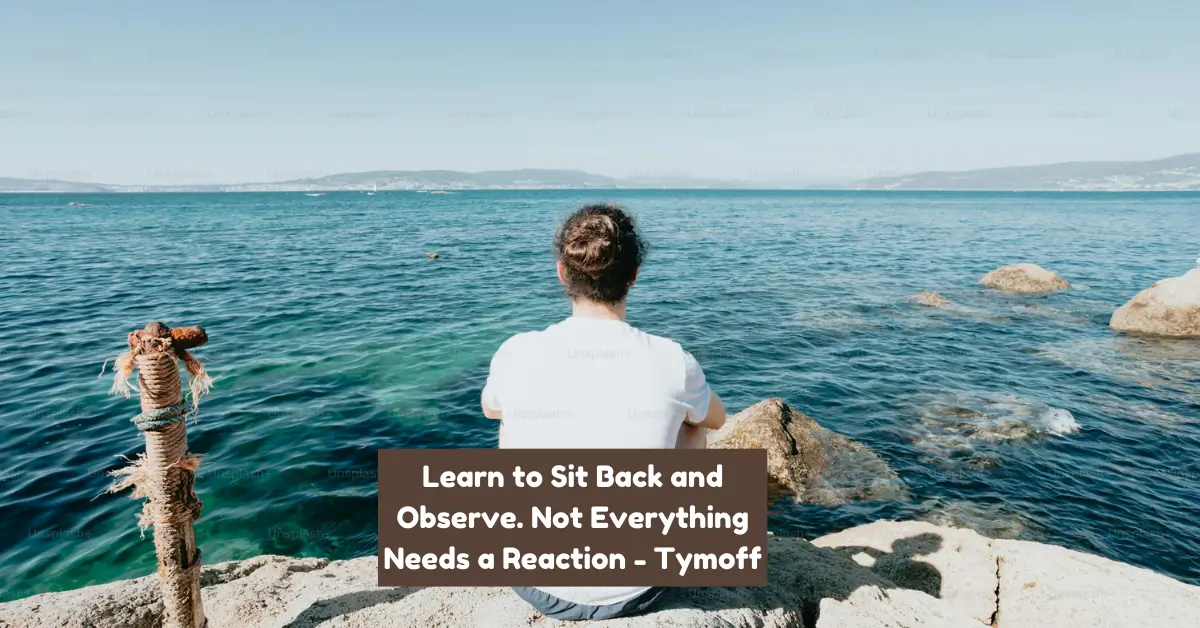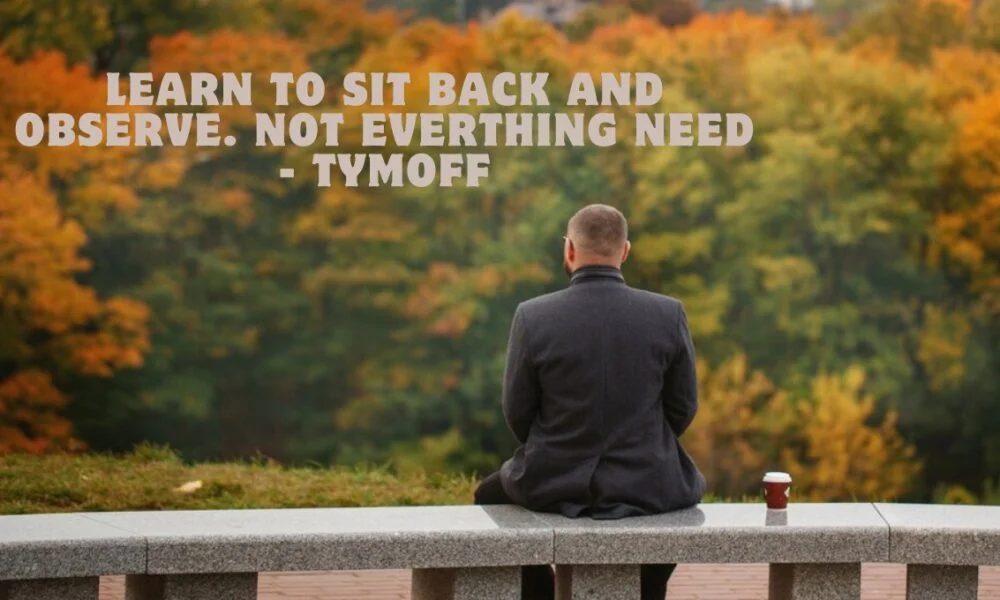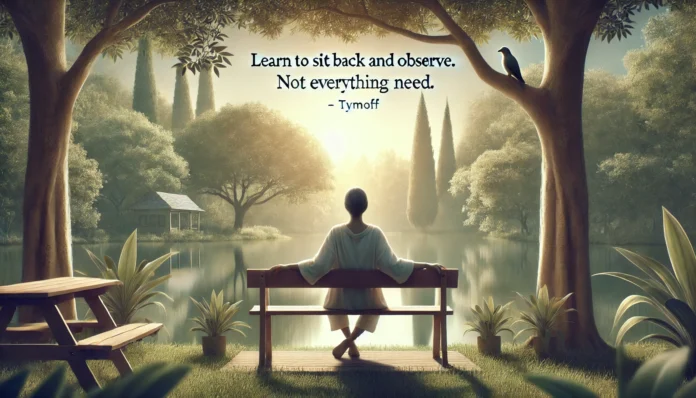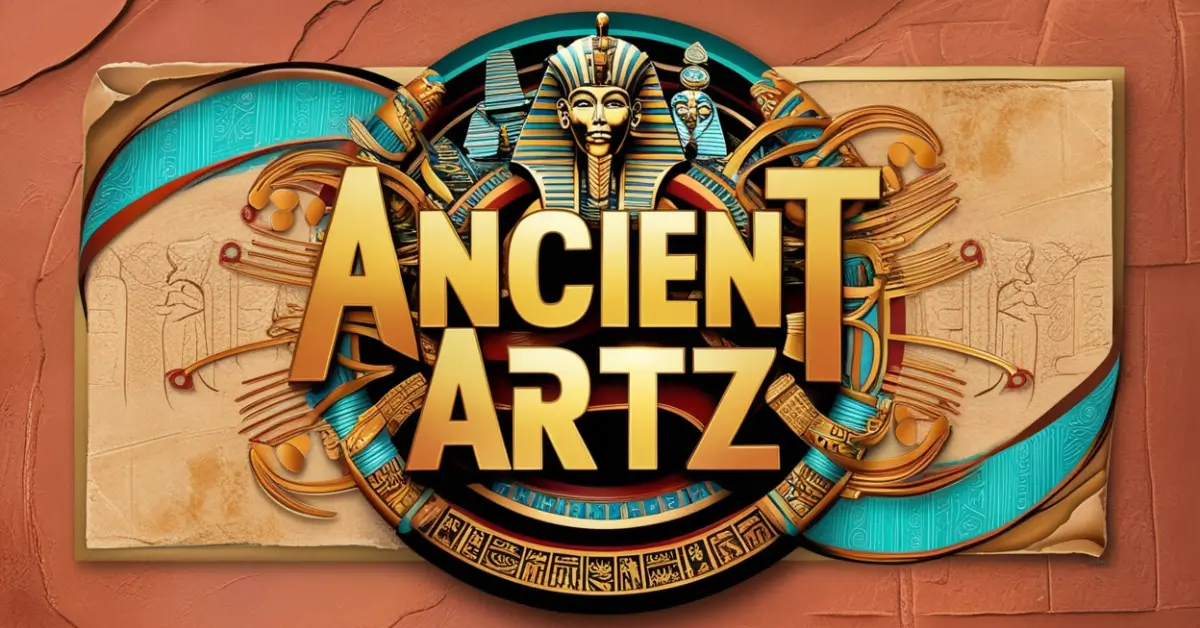
Learn to Sit Back and Observe. Not Everything Need – Tymoff’s Wisdom for Emotional Growth

In today’s fast-paced world, the quote “Learn to sit back and observe. Not everything need – Tymoff” stands as a reminder to embrace a mindful, patient approach to life. This philosophy encourages individuals to step back, observe situations, and make thoughtful decisions rather than acting impulsively.
By incorporating practices such as mindfulness, self-reflection, and emotional intelligence, we can foster personal growth and make more deliberate choices. This article explores the power of observation, how it enhances emotional intelligence, and its role in building better relationships and resolving conflicts.
Meaning of Learn to Sit Back and Observe. Not Everything Needs a Reaction
The essence of this quote lies in the idea of restraint and mindful observation. Reacting to every situation, especially in moments of stress or conflict, can often escalate the problem rather than resolve it. By sitting back and observing, we allow ourselves time to reflect and gain a better understanding of the circumstances before taking action. This approach can significantly improve decision-making skills and help maintain emotional control.

Taking a step back enables us to break away from impulsive reactions and instead focus on thoughtful responses. Whether dealing with work-related stress, personal conflicts, or unexpected situations, observation allows us to process information clearly. Warren Buffett, a master of this practice, is known for his thoughtful decision-making style, often advocating for patience before reacting to market changes.
The Power of Observation in Everyday Life
Observation is a powerful tool that extends beyond the realm of professional life. By being observant, we become more attuned to social dynamics, allowing us to understand people’s emotions and intentions. This insight can help improve relationships and foster better communication. Active listening, a key element of observation, involves fully engaging with what others are saying without the need for an immediate response.
In our everyday interactions, the ability to observe and remain non-reactive enables us to see things from different perspectives. Sherlock Holmes, the fictional detective, embodies the power of observation in solving complex cases. His ability to carefully observe details, analyze situations, and remain calm is a testament to how observation can be a valuable skill in life’s various challenges.
Why Reacting Immediately Can Lead to Stress
Reacting instantly to situations often results in heightened stress levels, particularly when emotions are running high. When we act impulsively, we may say or do things that we later regret, leading to misunderstandings and unnecessary conflict. This is where the wisdom of Tymoff’s quote comes into play—by pausing before reacting, we can reduce emotional strain and approach situations with greater clarity.
Mindfulness, an important practice in emotional control, teaches us to take a moment before responding. Through mindfulness meditation, we learn to observe our thoughts and emotions without judgment, allowing us to manage stress more effectively. This not only benefits our mental health but also improves our ability to handle challenging situations with patience and calmness.
How Observation Enhances Emotional Intelligence
Emotional intelligence is the ability to recognize, understand, and manage our own emotions as well as the emotions of others. Observation plays a crucial role in developing this skill. By being mindful of our surroundings and the behavior of others, we become more aware of how our actions and words affect those around us. This heightened awareness fosters better emotional control and empathy.
Leaders like Mahatma Gandhi, who was known for his exceptional emotional intelligence, practiced observation in his pursuit of social change. Gandhi’s ability to observe and understand the needs of people allowed him to respond thoughtfully, making him a powerful figure in history. By practicing observation, we can improve our emotional intelligence and build stronger, more empathetic relationships.
Patience and Clarity: The Benefits of Taking a Step Back
One of the greatest benefits of observation is the clarity it brings. When we sit back and observe, we gain a clearer understanding of the situation and can make informed decisions. Patience is key to achieving this clarity. In contrast to reacting impulsively, taking a step back allows us to assess the bigger picture and consider long-term outcomes rather than focusing on immediate gratification.
Steve Jobs, the visionary behind Apple, often advocated for the importance of patience in innovation. By observing market trends and consumer behavior, Jobs was able to make strategic decisions that led to the development of revolutionary products. His ability to take a step back and patiently observe the landscape played a significant role in Apple’s success.
Using Mindfulness to Improve Decision-Making
Mindfulness is a powerful tool that can enhance decision-making by promoting a non-reactive mindset. Through mindfulness meditation, individuals learn to focus on the present moment and observe their thoughts without being swept away by emotions. This practice fosters calm decision-making by allowing us to process information more clearly and rationally.
Studies on emotional intelligence suggest that mindfulness not only improves our ability to manage emotions but also enhances cognitive function. When we practice mindfulness, we become better equipped to make decisions that are thoughtful and deliberate rather than impulsive. This has been particularly effective in leadership, where mindful leaders can guide their teams with clarity and purpose.
The Importance of Active Listening in Social Interactions
Active listening is an essential aspect of observation, especially in social interactions. By fully engaging with what others are saying, we show respect and empathy, which helps build stronger relationships. In contrast, when we react too quickly, we may miss important cues or misunderstand the emotions behind the words.
Incorporating active listening into our daily lives can lead to better communication and improved relationships. Whether in personal or professional settings, practicing active listening helps us respond thoughtfully rather than react impulsively. This approach fosters trust and mutual respect, paving the way for more meaningful interactions.
How Thoughtful Observation Strengthens Relationships
In relationships, thoughtful observation plays a vital role in understanding the needs and emotions of others. By observing without reacting immediately, we can respond in a way that strengthens the bond rather than creating conflict. For example, during disagreements, stepping back to observe the situation allows us to identify underlying issues and address them calmly.
This practice is particularly important in personal relationships, where emotional responses can sometimes cloud judgment. By practicing observation and active listening, we can foster deeper connections with our loved ones and create an environment of trust and understanding.
Developing Observational Skills for Leadership
Effective leadership requires strong observational skills. Leaders who take the time to observe their teams and understand individual strengths and weaknesses can guide their organizations more effectively. Observational leadership involves watching, listening, and analyzing before making decisions or taking action.
Mindful leadership, a concept that emphasizes observation and self-reflection, has gained popularity in recent years. Leaders who practice mindfulness are better equipped to manage stress, make sound decisions, and foster positive workplace dynamics. Warren Buffett, one of the most successful investors, is known for his observational leadership style, often taking time to analyze the market before making investment decisions.
Also Read: I Fear No One, But Respect Everyone – Tymoff
Strategies for Practicing Mindful Observation
To cultivate a habit of mindful observation, there are several strategies one can employ. First, practicing mindfulness meditation helps train the mind to focus on the present moment and observe without judgment. This daily practice enhances emotional control and promotes a non-reactive mindset.
Additionally, incorporating reflective practices, such as journaling, can help individuals process their thoughts and emotions more effectively. By reflecting on daily experiences, we can gain valuable insights that inform future decisions. Self-discovery techniques, like these, are essential for personal growth and emotional intelligence development.
The Role of Observation in Conflict Resolution
In conflict resolution, observation is a powerful tool for understanding the root causes of disagreements. Rather than reacting impulsively, taking the time to observe the dynamics at play allows for a more thoughtful approach to resolving issues. By observing both verbal and non-verbal cues, we can gain a deeper understanding of the emotions involved.
Conflict resolution strategies often emphasize the importance of patience and observation. By approaching conflicts with a non-reactive mindset, individuals can de-escalate tensions and find solutions that benefit all parties involved. This approach not only resolves immediate conflicts but also prevents future disagreements from escalating.
Observation as a Tool for Personal Growth
Observation is not just about understanding others—it is also a tool for self-improvement. By observing our own thoughts, behaviors, and reactions, we can identify areas for personal growth. Self-reflection allows us to recognize patterns in our behavior and make adjustments that lead to positive change.

Reflective practices, such as meditation and journaling, are instrumental in personal development. By taking the time to observe and reflect, we can cultivate a deeper understanding of ourselves and make more informed decisions in our personal and professional lives.
Learning from the Masters: Examples of Successful Observers
Throughout history, many successful individuals have mastered the art of observation. Mahatma Gandhi, known for his non-reactive approach to social change, practiced observation to understand the needs of his people and respond thoughtfully. His ability to observe without reacting impulsively made him a powerful leader in the fight for justice.
Similarly, Warren Buffett’s investment strategy is rooted in observation. By patiently observing market trends and company performance, Buffett makes informed decisions that have led to his financial success. These examples demonstrate how observation can lead to significant achievements in various fields.
Incorporating Reflection and Mindfulness into Daily Life
Incorporating mindfulness and reflection into daily life can have transformative effects on both mental health and personal relationships. Mindfulness meditation, in particular, trains the mind to focus on the present moment and observe thoughts without judgment. This practice fosters emotional control and helps individuals navigate life’s challenges with greater ease.
Additionally, setting aside time for daily reflection allows individuals to process their experiences and gain valuable insights. Whether through journaling or quiet contemplation, reflection helps us stay grounded and make more thoughtful decisions in our everyday lives.
The Psychological Impact of Observing Before Reacting
Observing before reacting has a significant positive impact on psychological well-being. By pausing to observe, individuals can avoid the emotional overload that comes from reacting impulsively. This practice promotes emotional control, which reduces stress, anxiety, and the chances of escalation in tense situations. Mindfulness, a key component of observation, enables individuals to become more self-aware, helping them to recognize their emotional triggers and respond in a more thoughtful manner.
Moreover, the act of observing allows the brain to process information more thoroughly. It encourages rational decision-making, as opposed to emotionally charged responses. Studies on emotional intelligence show that individuals who practice mindful observation have better cognitive function, are more empathetic, and are less likely to experience negative emotions like anger or frustration. In essence, observing before reacting leads to greater emotional resilience and mental clarity, enabling individuals to navigate life’s challenges with poise and confidence.
Quick Facts
- Quote Origin: “Learn to sit back and observe. Not everything needs a reaction” – Tymoff.
- Key Concepts: Mindfulness, emotional intelligence, active listening, and thoughtful response.
- Psychological Benefits: Reduced stress, improved decision-making, better emotional control.
- Key Figures: Warren Buffett, Mahatma Gandhi, Steve Jobs, Sherlock Holmes (fictional character).
- Observation Strategies: Mindfulness meditation, active listening, self-reflection, and patience.
- Main Purpose: Encourages thoughtful observation before reacting to situations.
- Applications: Personal growth, leadership, conflict resolution, relationship building.
Final Thoughts
In a world where reacting has become second nature, the quote “Learn to sit back and observe. Not everything needs a reaction” from Tymoff offers a powerful reminder to pause, reflect, and respond mindfully.
Whether in personal relationships, professional environments, or everyday interactions, practicing observation allows us to manage stress better, make thoughtful decisions, and foster meaningful connections. By incorporating mindfulness, emotional intelligence, and self-reflection into our lives, we can enhance our emotional well-being and become more resilient, empathetic individuals.
Leaders like Warren Buffett and Mahatma Gandhi have demonstrated the power of observation in achieving great success and fostering positive change. By learning to sit back and observe, we can follow their example and create more meaningful, thoughtful responses to life’s challenges. Observation is not just a skill—it is a practice that can transform the way we interact with the world, bringing clarity, patience, and wisdom into our everyday lives.
Also Read: AOPG Trello
FAQs
Q: How does observation help in improving decision-making?
A: Observation promotes patience and allows individuals to gather more information before making decisions. This helps in reducing impulsive reactions, leading to more thoughtful and informed choices. Practices like mindfulness and reflective thinking enhance cognitive clarity, improving decision-making abilities.
Q: Why is emotional intelligence important in observation?
A: Emotional intelligence allows individuals to recognize their own emotions and those of others. When combined with observation, it helps people understand situations better and respond with empathy rather than reacting impulsively. This leads to stronger relationships and more effective conflict resolution.
Q: What are some techniques for practicing mindful observation?
A: Techniques include mindfulness meditation, active listening, and self-reflection. These practices train the mind to stay present, avoid emotional reactions, and approach situations with clarity. Journaling and quiet contemplation are also helpful for processing thoughts and emotions.
Q: How does observing before reacting reduce stress?
A: By pausing to observe before reacting, individuals can avoid the immediate emotional response that often leads to stress. Observation allows for a more measured, thoughtful response, helping to de-escalate tensions and manage anxiety more effectively.
Q: Can observing before reacting improve personal relationships?
A: Yes, observing before reacting helps in understanding the emotions and needs of others. By practicing active listening and empathy, individuals can respond thoughtfully, fostering deeper connections and reducing misunderstandings in personal relationships.









